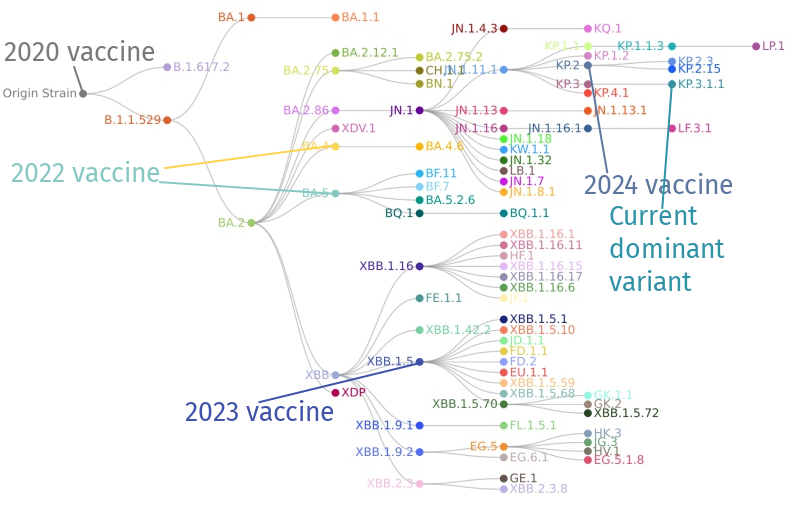I'm not anti-vaxx, I just don't trust American health agencies. Wouldn't even think twice if this was in most other countries
I mean even if the vaccine is the exact same as it was last year it's still worth getting. I wouldn't fret too much over it. Vaccines for viruses like covid aren't effective forever, so it's still worth it to get a booster.
I mean even if the vaccine is the exact same as it was last year it's still worth getting
But it's probably not. They probably did try to genuinely make a vaccine for the newest strains of covid but I'm afraid they're pushing out incomplete garbage to cash in on that annual check from the government
- Show
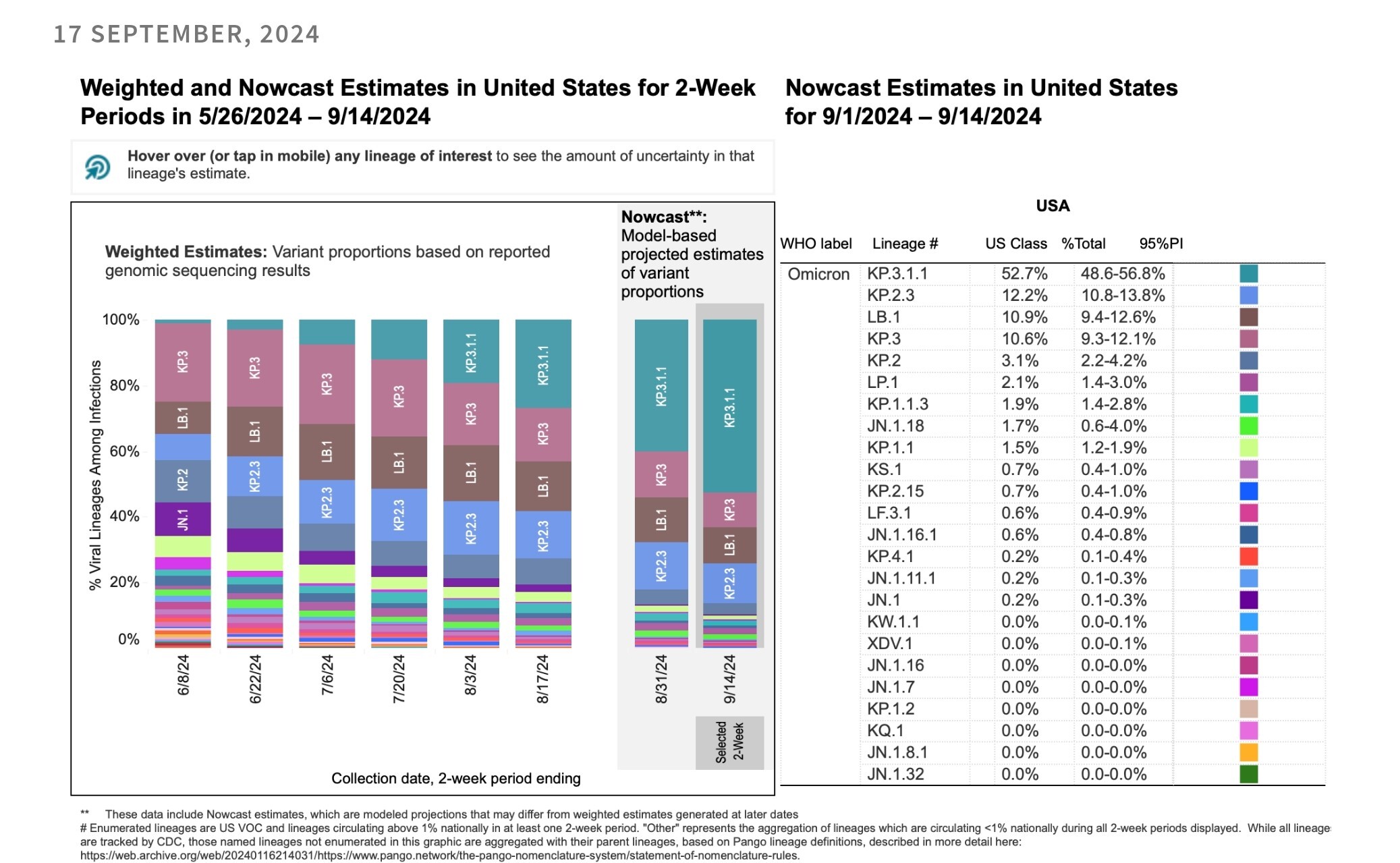 Show
Show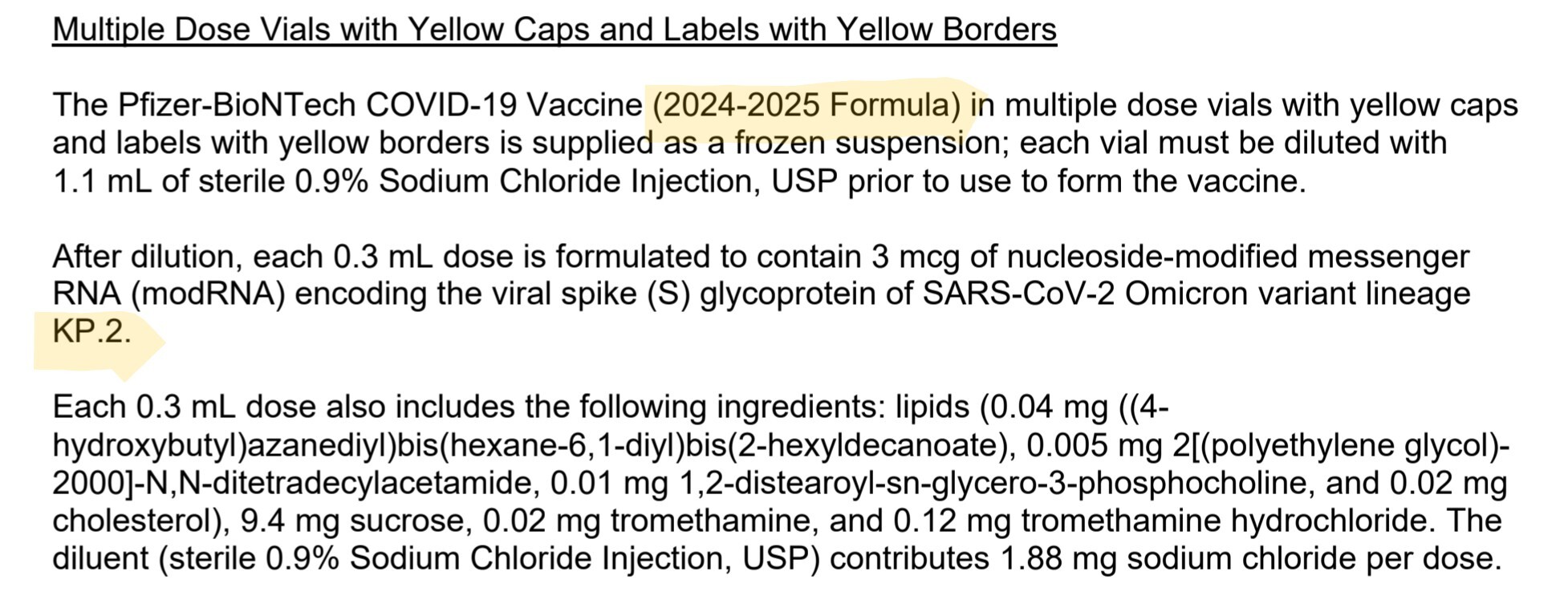 Show
Show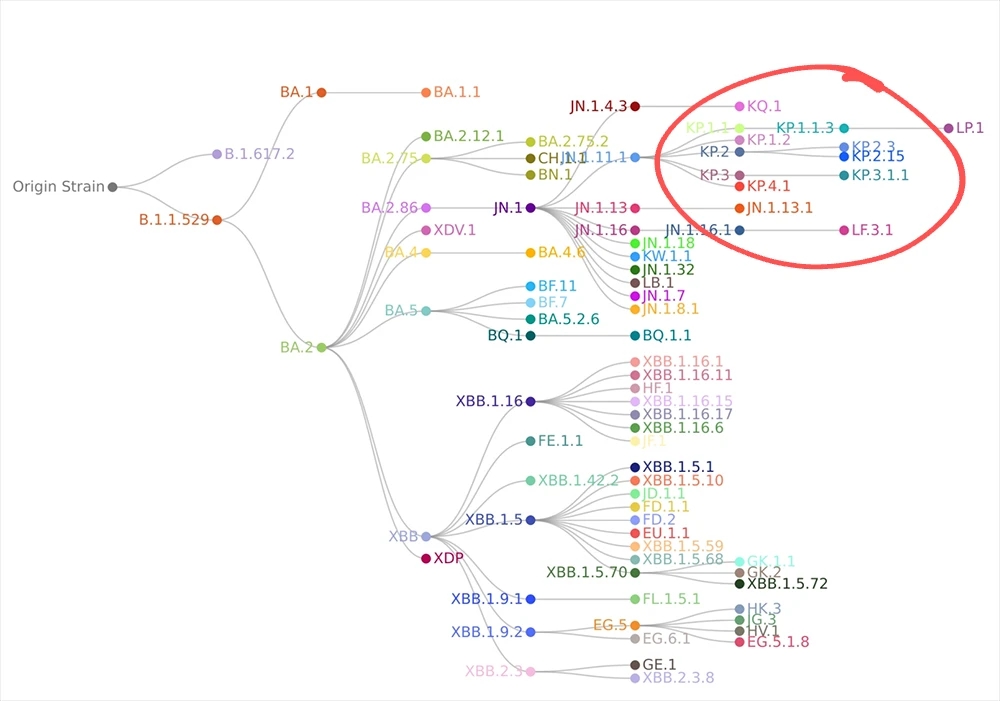
Currently, over half of infections in the US are from the KP3 variant. The virus is mutating so fast our vaccine production is struggling to keep up. The current vaccines target KP2, which is closely related to KP3. These vaccines will better protect you against what is currently circulating compared to the vaccines we have had previously.
No yea I understand the reasoning behind why vaccines get updates. I meant like trial testing data for safety profile and what not
- Show
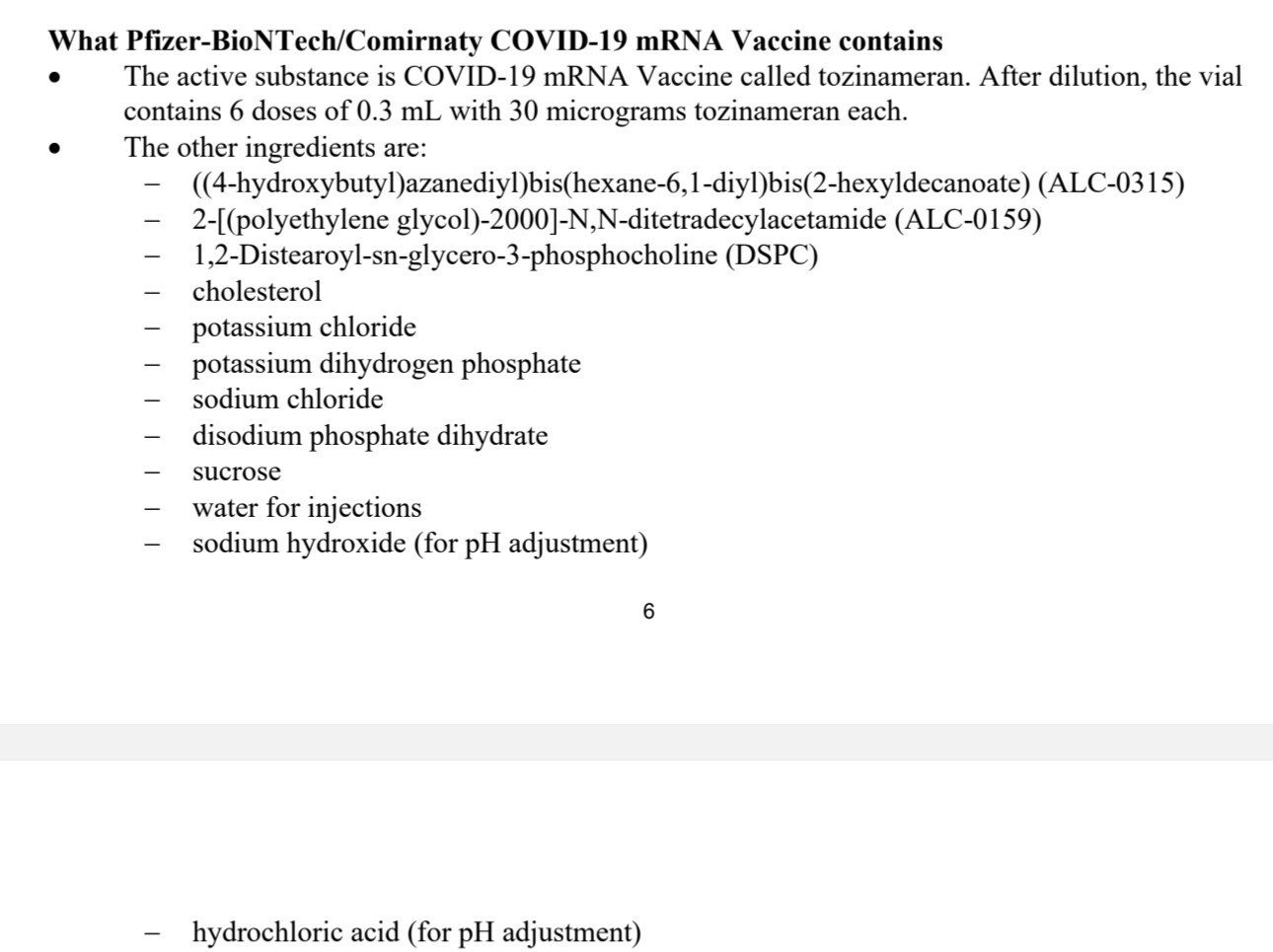
I believe these are the original ingredients from the first round. Pfizer changed which preservatives they use, but it appears the preservatives in the current Pfizer shot are what Moderna used originally. Besides that all they are changing is the specific mRNA sequence to encode for and target the new variants. In terms of safety, they are no different than what was approved in the original study.
In terms of safety, they are no different than what was approved in the original study.
Has it been studied that changing the mRNA encoding doesn't affect the safety? From my extremely limited understanding that shouldn't be something that can just be assumed right?
All that is changing is the little piece of non-infectious and benign spike protein that your own ribosomes are producing, so that your immune system can identify it later. The mRNA sequence itself is only present for a couple days at most before it degrades and you no longer produce the spike proteins.
And yes, even under the emergency use authorization, each new mRNA sequence is tested for safety and efficacy in animals and humans before release.
The sequence could encode for millions of bits of viruses and other things that would all be non-harmful. The preservatives and other ingredients are what have caused serious events such as myocarditis, anaphylaxis, etc.
I will try to find a meta analysis of a bunch of mRNA vaccines or a study on mRNA technology when I can.
Basically though, it is impossible that changing the spike protein is gonna change anything except what your immune system learns.
Updated Moderna as well confirming the same thing for good measure:
Show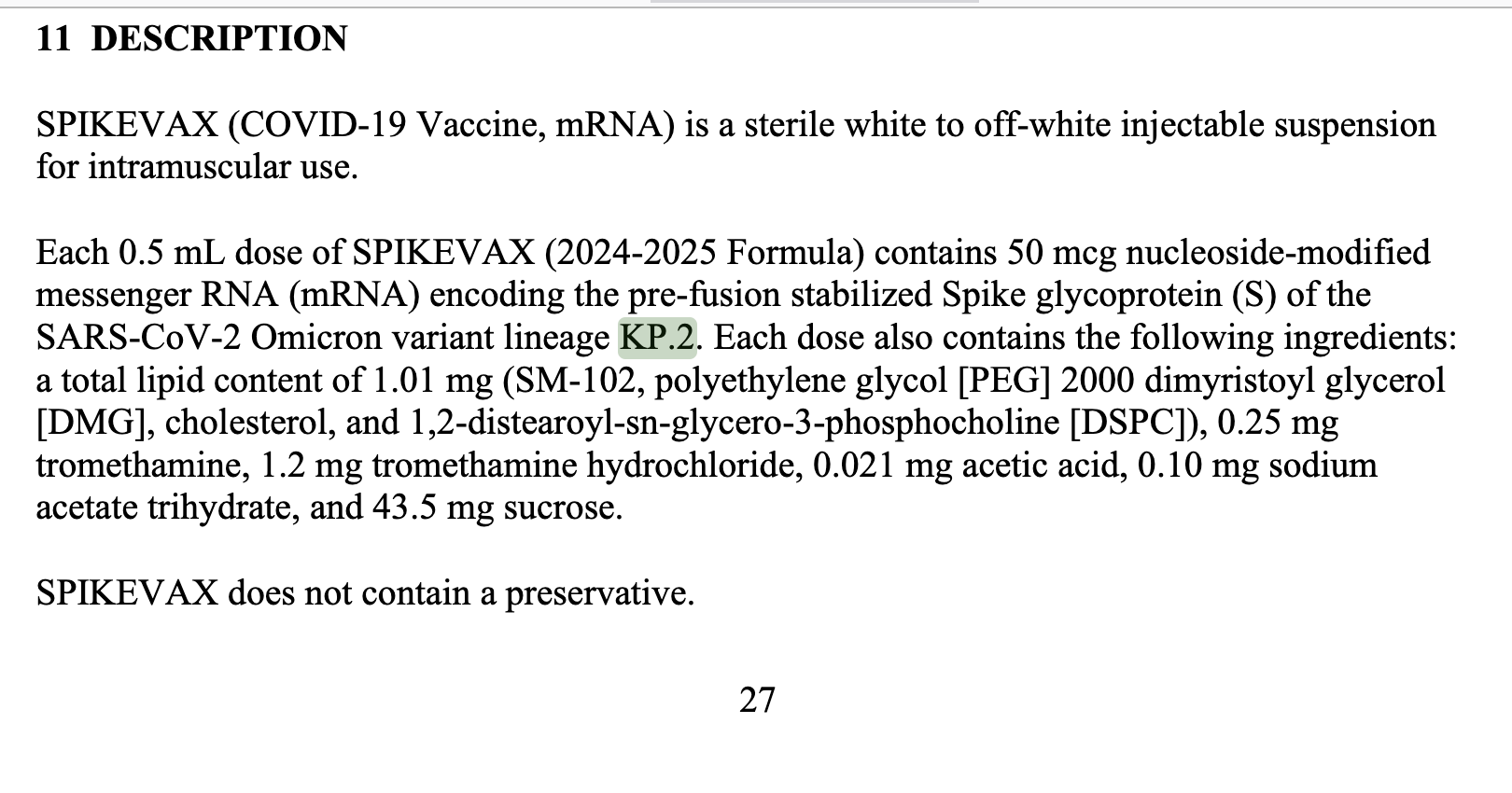
Source: https://static.modernatx.com/pm/6cef78f8-8dad-4fc9-83d5-d2fbb7cff867/5efa7d9d-05e8-46b5-945a-637c2867bd00/5efa7d9d-05e8-46b5-945a-637c2867bd00_viewable_rendition__v.pdf (easily reachable by clicking the link entitled "Prescribing Information" at https://www.modernatx.com/en-US/products/spikevax)
tl;dr - Yes, it's a good idea to get the vaccine. The new vaccine will provide protection from the newest common strain of the virus.
Since we aren't taking steps to control the spread of the virus, and the vaccines aren't sterilizing vaccines, and because it's so god damn infectious, the virus mutates about 3-4x as quickly as the flu, and frequent vaccinations are needed.
Vaccines cause your body to make antibodies to fight the virus for approximately 2-6 months, depending on the person. After the protection from antibodies wear off we are reliant on T and B immune cells to fight the virus, which is more risky.
In theory the T and B cell protection should be "good enough" for most normal healthy people, and a regular infection won't do much damage, and your body will create another round of antibodies for another several months until you are either infected again or can get a new vaccine. Unfortunately, for T and B immune cells to work the virus will have entered the bloodstream by that point and it's a roll of the dice as to how far the infection gets and how much damage it does before those cells can get to work to clear the virus and new antibodies are produced.
The sheer amount of people being infected means that the people for whom this protection isn't nearly "good enough" are staggeringly high, resulting in high death rates among the medically vulnerable most of the year, and shocklingly high long covid rates for everyone else. Along with people who just feel "off" for months after covid, or have damage to parts of the body were we don't "feel" damage.
IMO we really should be vaccinating twice a year, with vaccines updated to match the current strains, to provide more protection from antibodies. And because the virus is mutating so quickly, the antibodies you do have might not be enough to prevent infection. It all depends on what vaccines you got, what you've been exposed to, and how your body reacts to all of it.
The virus is basically common in high rates, everywhere, for most of the year. But since they don't want to ask healthy people to get two vaccines a year, and the benefits of it aren't totally certain at this point with theoretical downsides, in the US they settled on softly recommending one vaccine before the fall. And only about 20% of people are even bothering with the new vaccines at this point. Rolling the dice with constant infections is how most of the world is handling it, and if you skip the vaccine for a year this is what you will be doing.
We'll see how it plays out over the next several years. Better vaccines are in the works (like mucosal vaccines, which will hopefully prevent the virus from entering the bloodstream where it does the most damage) but it will be at least a year or more before they are approved, if the technology even pans out.
To me it seems pretty obvious that the more infections you can avoid, whether they end up making you seriously ill or not, the better off you will be in the long term. That means getting all the vaccinations you can get.
I understand why there's yearly vaccines for covid now, I meant specifically if this new one does what they claim it does
I haven't run across any trial results. I've read different things, like the new formula is not as effective, but nothing definitive. Safety seems good for all of them, especially when compared to just getting infected.
If you had a bad experience with the mrna ones you will want to seek out Novavax, which is harder to find but has less side effects and seems to offer slightly longer protection. Even though it targets a slightly older strain is offers just as much or more protection.
I cant find the sorces where I read all this at the moment, but i found this:
What’s new about this year’s updated COVID vaccines?
As in previous years, there are mRNA vaccines—one from Moderna, one from Pfizer—and a protein-based vaccine, from Novavax. One nuance this year is that the mRNA and protein-based vaccines target different—though closely related—variants.
The updated mRNA COVID vaccines from Moderna and Pfizer are based on the KP.2 strain, one of the FLiRT variants that have been spreading since early spring. These variants and their sub-variants have caused the majority of infections during this summer’s COVID wave. The protein-based Novavax vaccine is based on the JN.1 variant, which accounted for the majority of COVID infections in the first few months of 2024 and is the parent strain from which KP.2 and other currently circulating variants branch from.
At the end of the day, laboratory experiments show that all of the updated vaccines available this season can recognize circulating COVID variants and therefore should be similarly effective in reducing your chance of becoming severely ill from COVID infection or needing to be hospitalized.
https://publichealth.jhu.edu/2024/what-to-know-about-updated-covid-vaccines-for-2024-25
In the sense of needing a yearly booster, it's just like the flu. Immunity doesn't last forever, and changes in prevailing strains make your extant immunity less effective.
Posted here instead, since @Sulvor@hexbear.net already shared the variant visualization





